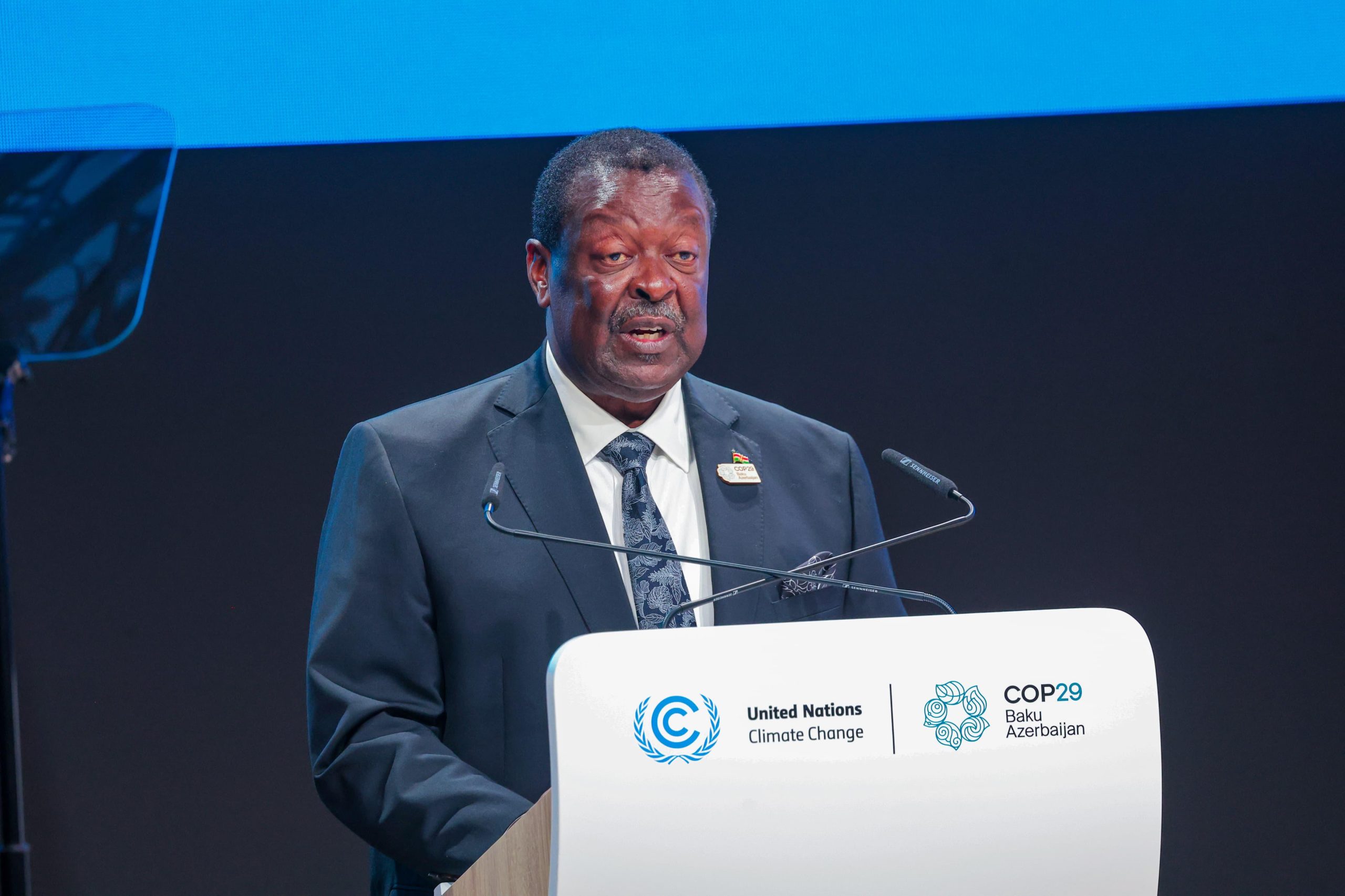
Mudavadi lauds first Africa Climate Summit held in Nairobi at COP 29

The inaugural Africa Climate Summit held in Nairobi in September 2023 has been lauded at the ongoing COP-29 Summit in Baku, Azerbaijan.
Prime Cabinet Secretary Musalia Mudavadi said the progress made since the inaugural Nairobi declaration has continued to serve as a basis for Africa’s common position in the global climate change process.
Mudavadi said African countries have appreciated the interlink between development aspirations and climate action.
“The strides we have made to date are commendable, but remain insufficient given the growing scale of the challenges we face as a continent, and the scope of action demanded of us. We must therefore up the game to turn all the commitments into concrete outcomes.” he said.
Mudavadi said this when he addressed the Africa Climate Summit, high level meeting at the margins of the ongoing COP-29 in Baku.
Mudavadi also the Foreign and Diaspora Affairs Cabinet Secretary, noted that the aim of the Nairobi declaration reached at the first Africa Climate Summit was to transform the climate narrative from the usual blame game to win- win solutions for mankind and the planet.
He emphasized that focus was on increasing exposure to climate change and its associated costs, both globally and particularly in Africa. With the expectation of escalating climate crises in terms of frequency and intensity, urgent action is required to mitigate these challenges.
“We must mobilize the much-needed climate finance from both the public and private sources, in scale and with urgency, striking a balance between mitigation and adaptation to ensure economic and social resilience as well as planetary safety.” he told the high-level meeting in Baku.
“The replenishment of the African Development Fund (ADF) and International Development Association (IDA) is therefore critical to finance resilient infrastructure, expand energy access, and drive sustainable development across the continent.” he added.
A robust ADF and IDA replenishment he said will enable energy access for over 300 million Africans thus ensuring development in a climate smart way.
Mudavadi also called for reforms on the current global financial architecture including the introduction of debt-for-climate swaps, climate-specific funds, and restructured lending terms to enable Africa respond effectively to the climate emergencies.
Taking stock, Mudavadi in his address to the summit pointed out that the Nairobi declaration has seen bold commitments translated into key initiatives that include “The Accelerated Partnership for Renewables in Africa” (APRA) and Mission 300.
He also highlighted renewable energy investments in over 15 African countries to amplify access to clean energy by over 300 million Africans and “The African Green Industrialization Initiative” (AGII) that promotes sustainable industrial growth across the continent by developing low-carbon and resource-efficient industries.
“AGII positions Africa as a leader in climate-smart growth showcasing that industrialization and environmental protection are mutually reinforcing,” he said.
The Prime CS also noted that “The Africa Climate-Smart Agriculture (CSA) Alliance”, that brings together governments, research institutions as well as the development community to promote sustainable farming practices, provide farmers with tools to adapt and build resilience to the changing climatic conditions.
He explained that the above initiatives demonstrate the momentum being gathered and the appetite that is growing which is a clear testament to what Africa can accomplish when by acting with purpose, strategy, and solidarity.
“The Locally-Led Action programs such as Financing Locally- Led Climate Action (FLLoCA), is Africa’s approach and model for global climate policy to help local communities implement climate solutions tailored to their unique challenges.”
Mudavadi further noted inviting African countries to join hands in galvanizing a coordinated and collaborative effort to fulfil the goals of the Nairobi Declaration and beyond.
He urged African Countries to deepen partnerships with the African Development Bank, the African Union, and regional organizations to enhance coordination, share resources, and streamline climate initiatives across Africa.
